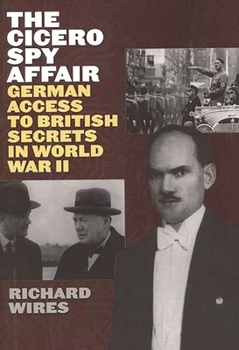The Cicero Spy Affair: German Access to British Secrets in World War II
Select Format
Select Condition 
Book Overview
The episode of the opportunistic valet of Britain's ambassador to neutral Turkey during World War II--dubbed Cicero for the eloquence of the top-secret material he appropriated from his employer Sir Hughe Knatchbull-Hugessen and sold to the Nazis--is a staple of intelligence lore. Yet this remarkable and sometimes comical story has often been recounted with little regard for the facts, most prominently in the popular film Five Fingers. Now, historian and former intelligence officer Richard Wires presents the first full and objective account of the Cicero spy episode, offering closure to past discrepancies and credible solutions to remaining mysteries. Copiously documented, The Cicero Spy Affair provides readers with the true chronology of events and places them in an international context. It is a story set in the hotbed of intrigue that was wartime Turkey, replete with a dramatic car chase, a series of colorful mistresses ever loyal to their lover the spy, and an old-school British ambassador whose documents are photographed at night as he plays the piano in the drawing room and/or slips into a sleeping pill-induced slumber.
Despite the affair's amusing aspects, it is also a sobering tale in which there are no winners and from which there are serious lessons to be learned. Germany never made use of the highly sensitive British documents it obtained during this crucial four-month period of the war because the handling of the information was caught up in a bitter and wasteful personal rivalry between Ribbentrop and Schellenberg. It was sheer luck for the British that their war effort did not sustain any significant damage. For, while the book states definitively that security regarding the Allied invasion of Normandy was not breached in the Cicero affair, Germany did gain a potential advantage concerning campaigns in the Aegean and the Balkans. This embarrassed the British greatly, especially since Cicero walked away a free man. However, the greedy valet--the most highly paid spy in history at that time--did not achieve his goals, either; he discovered some years later that the British banknotes he insisted on as payment were counterfeited by the Germans as part of a larger counterfeiting project. Cicero died a desperate man, deeply in debt--a fitting anticlimax for an espionage episode resulting in neither bodily injury nor strategic impact, but in humiliation on all sides.




